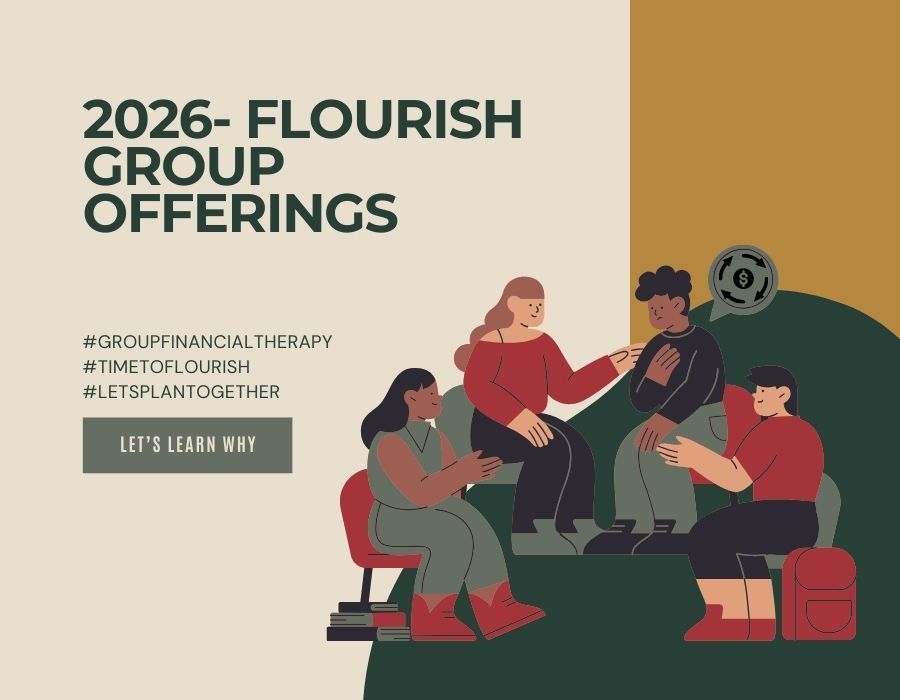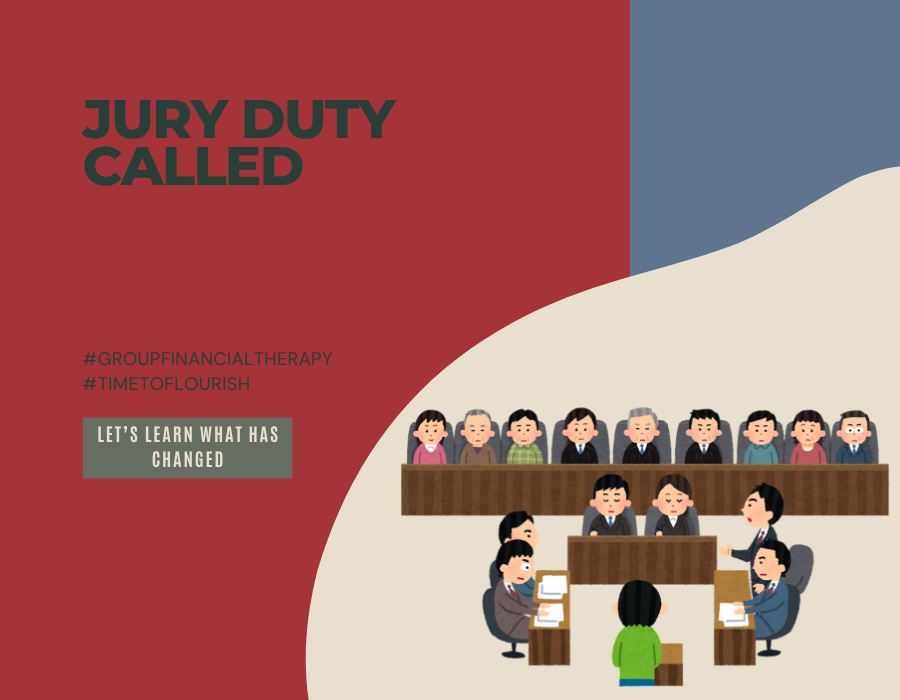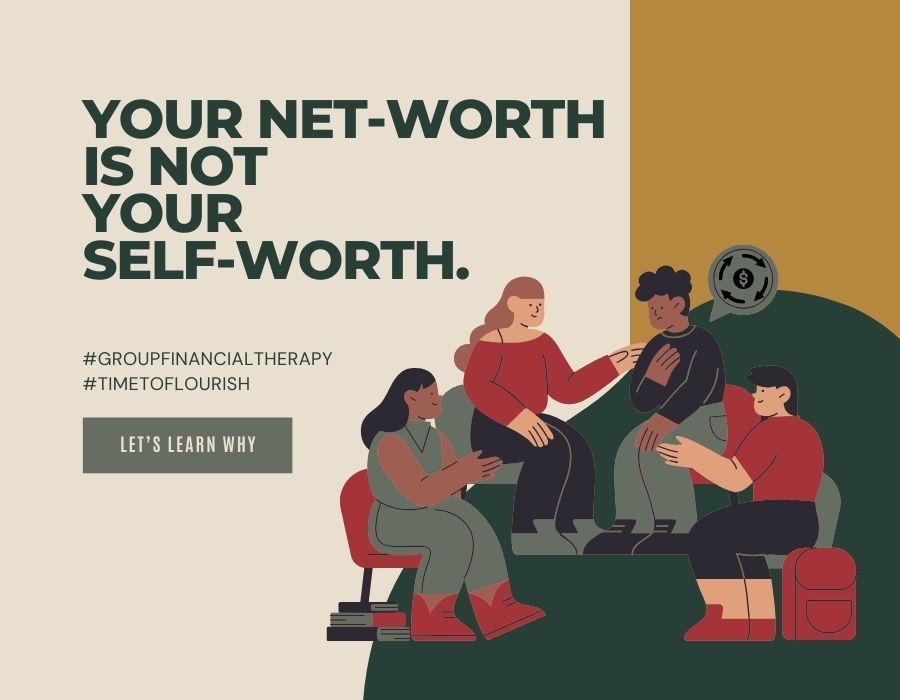Exploring Financial Therapy: What is it, and Why do I Need to Heal my Relationship with Money?
When I began working as a therapist in 2015 everything felt new and fresh, but everything was also scary and uncertain. I could feel that there was excitement in my clients who chose me to work with them and that they had hope that something inside of them could change in a meaningful way. As I have gotten more and more comfortable as a therapist, and dare I say more effective as a therapist, I can see that though people felt excited and ready for change many years ago, the depth of which I am able to work with clients is totally different. Do you know what the consistent trend is through all those years? Money is the last topic people will talk about, even if it is the biggest stressor in their life. They often carry a level of emotion, guilt, and fear attached to what would happen if people truly knew that part of their story. That somehow if they were to talk about it, all their worst fears would come to life, and they wouldn’t be able to manage the level of emotion that would come up if others knew…. I mean if they really knew.
So, in early 2023, after having many clients coming to the point of them sharing their real truths and feeling completely paralyzed by money or some facet of it, I began reaching out to all the financial people I knew to point me in the right direction to getting the tools my clients need. In the Fall of 2023, I FINALLY found Financial Therapy. It was as if I knew the knowledge that I needed to get and for once be able to provide my clients with something more than empathy. They needed hard tools. Clear direction. They wanted something more.
I am deeply passionate about all that financial therapy has to teach us and I really think you should be too!
Let's embark on a journey to uncover what financial therapy is all about and how it can profoundly impact your relationship with money.
Understanding Financial Therapy
Financial therapy combines elements of financial planning and psychological counseling to help humans understand and improve their financial behaviors, attitudes, and beliefs. It recognizes that money is not merely a practical tool but also a deeply emotional and symbolic aspect of our lives.
I am able to work with women to weed through all of the information that they have had in their brains that tell them that they should “just take the emotion out of it,” and do something better. The fact of the matter is, we are all human and respond in human ways. Our decisions, no matter how big or small, are decided upon emotions. When a person is going to put an offer in on a house, sometimes what is needed is a “love letter” to the seller to set you apart from the other offers on the property. Why do people do this? To pull at the heart strings of the seller to let them know that you are serious. To evoke emotion. To have them make an emotional decision to pick them. Emotional.
Women are historically regarded as people that shouldn’t be free to do with money as they will because they are ….. “frivolous,” “careless,” “spontaneous,” “reckless”…. Etc. To the fact that when I went to find some great memes to include in a presentation I found HUNDREDS of memes mocking women for their choices with money, how men need to hold tight to their money (because of women), and undertones of societies inability to trust women with money. What started out as a way for me to incorporate some humor, quickly became a fueling of my anger towards the reasons I have seen women suppress their financial stresses for YEARS! Seriously, I just wanted a good laugh, I wanted to see memes where women were bada**es shouting from the rooftops that they are overcoming and laughing at the ridiculous notion that just because we have vaginas and emotions that we can’t be trusted with money.
Just as with any therapy, the goal is to foster a healthier relationship with money, alleviate financial stress, and promote overall well-being. This is only going to be possible if we work together to change the culture around what we as women believe is possible.
The Roots of Financial Therapy
The roots of financial therapy can be traced back to various disciplines, including financial planning, psychology, counseling, and marriage and family therapy. It emerged from the realization that traditional financial advice often fails to address the underlying emotional issues that drive financial behaviors.
In the therapeutic world it is a revolving joke that people are more willing to talk about their sex lives way before their money lives. This has proven to be so true in so many different instances. Sex therapy was coined in the late 1960s where financial therapy was not officially named until 2008. For 40 years people were going to therapists willing to talk about their sexual dysfunction but were not talking about finances. Nor did the therapists probably have the skills to help them navigate all of the chaos that finances were becoming. The first credit card came on the scene in the 1950s. The nationwide household debt has continued to be in a sharp upward turn ever since. The 2008 housing crisis made everything really real and people didn’t have a choice but to talk about it. In the post COVID world we see even different changes that have greatly impacted how people interact with money. By integrating psychological insights into financial planning, financial therapy offers a holistic approach to money management. I don’t want the fear of talking about it to hold people back from living their best lives. I want to be a safe place where you can come, be heard and get the support that you have been wishing was available.
How Financial Therapy Works
We talk about money without REALLY talking about money first. We believe that one’s relationship with money is deeply intertwined with emotional well-being. We approach financial therapy with empathy, and compassion in a holistic approach that integrates mental health first and financial well-being second. We know too much at this point about how our nervous system responds when it is activated and needing to respond in fight, flight, freeze or fawning behaviors to know that the traditional financial literacy just isn’t enough to truly make lasting change in our human bodies. We truly need to address how your body responds when it thinks about money before we are able to address the big goals you have for yourself financially.
Financial therapy sessions typically involve discussions about money-related beliefs, attitudes, and behaviors. We use a variety of techniques, such as cognitive-behavioral therapy, mindfulness practices, parts work, and narrative therapy, to help clients explore their relationship with money and identify areas for improvement.
Some common topics addressed in financial therapy include:
- Money Mindset: Examining deep-seated beliefs and attitudes about money inherited from upbringing, culture, or past experiences.
- Financial Communication: Improving communication about money within couples or families to reduce conflicts and build mutual understanding.
- Financial Goal Setting: Helping clients clarify their financial goals and develop strategies to achieve them.
- Financial Anxiety and Stress: Addressing feelings of anxiety, guilt, or shame related to money and finding healthy coping mechanisms.
- Spending and Saving Patterns: Identifying patterns of overspending, undersaving, or other unhealthy financial behaviors and exploring their underlying causes.
- Life Transitions: Navigating major life events such as marriage, divorce, career changes, or retirement and understanding their financial implications.
Who Can Benefit from Financial Therapy?
Financial therapy is not just for those experiencing financial crises; it can benefit anyone seeking to improve their relationship with money. Whether you're struggling with debt, navigating a career change, planning for retirement, or simply want to feel more empowered about your finances, financial therapy can provide valuable insights and support.
- I specialize in working with women specifically. I believe that there is so much work that we can do together to change the way in which we interact with money to change the way the future women in our world approach their money lives whether at home or work. I often get asked if married women can do financial therapy without their spouses and the answer is ABSOLUTELY!! In fact, I encourage it. Many of the financial advisors I have known talk to me about the women they come across when their spouses pass and the women are fearful of handling the finances on their own. This is something that I can help you with! Let’s look that fear in the face and take its power away!
The Benefits of Financial Therapy
The benefits of financial therapy extend far beyond just improving your financial situation. By addressing the emotional and psychological aspects of money, it can lead to:
- Reduced stress and anxiety related to finances
- Improved communication and teamwork within couples or families
- Greater clarity and confidence in financial decision-making
- Enhanced overall well-being and life satisfaction
Finding a Financial Therapist. Am I a Good Fit?
In a world where money plays such a significant role in our lives, it's essential to cultivate a healthy relationship with it. Financial therapy offers a valuable pathway to understanding and addressing the emotional underpinnings of our financial behaviors. Whether you're facing financial challenges or simply want to feel more empowered about your money, exploring the realm of financial therapy could be a transformative journey towards financial well-being and peace of mind.
However, finding the right financial therapist is crucial for a successful experience. I am not going to be the best fit for everyone, and it’s important that you and I both know that. If you aren’t sure, don’t hesitate to schedule a consultation with me! It's also essential to find someone you feel comfortable opening up to and who understands your unique financial situation and goals. I am excited to get to know you and your journey with money.











